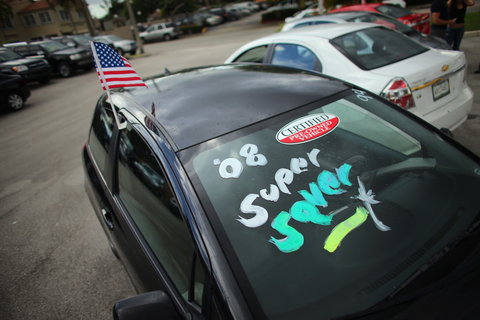 Joe Raedle/Getty Images
Joe Raedle/Getty Images
A used car for sale in Miami.
The city where you buy a used car can make a big difference in price, a new analysis finds.
CarGurus, a car shopping Web site, analyzed listings for about 3 million cars in large metropolitan areas to see how prices varied. A market was defined as an area within a 50-mile radius of the city center, to see how prices varied.
The analysis found that the less-expensive markets tend to be the most heavily populated urban areas, where there are more car dealerships and thus more competition, said Langley Steinert, founder of CarGurus. Costlier areas, in turn, tend to be smaller, less competitive markets.
The vast majority of listings on CarGurus are from dealers; it’s not certain that cars sold by private sellers would follow the same trend. But since private sellers also try to price their cars competitively, it’s “probable” that the trend is the same for those cars too, the site says.)
The analysis was based on an “instant market value” for each vehicle, a price estimate that CarGurus calculates using its own formula. The formula factors in the car’s make, model, year, mileage, trim, options, accident history and the listing’s specific location. CarGurus then used the average prices in each metropolitan area compare with the nationwide average. The study excluded cars from model years before 2000.
The analysis found that Miami topped the list of “most affordable” markets, followed by Cleveland; Rochester; and Detroit. (Next on the list came Stamford, Conn.; Akron, Ohio; Buffalo; Toledo, Ohio; New York; and Minneapolis.)
The most expensive cities are Jackson, Miss.; Seattle; Montgomery, Ala.; and Little Rock, Ark. (Followed by Knoxville, Tenn.; Mobile, Ala.; Fresno, Calif.; Memphis; Wichita, Kan.; and Lincoln, Neb.)
Compared with nationwide prices, used cars in Miami are nearly 7 percent less expensive on average, while those in Jackson, Miss., are 9 percent more expensive — a difference of about 16 percentage points, the analysis found.
What are consumers to make of the data? After all, even if you can find a car in a cheaper market, is it worth your while to travel a long distance way to pick it up?
Mr. Steinert conceded that it was unlikely to make sense for someone who lives in, say, Seattle, to travel to Miami just to save money on the price of the car. But the findings do suggest that when searching online for a car, you should widen your potential search area as far as possible beyond your local ZIP code.
When searching car listings on CarGurus, for instance, the default distance the tool uses is 75 miles — about an hour’s drive. But you could double that distance, to 150 miles, and still be within a reasonable drive to an area with potentially less expensive cars.”At least, drive two hours,” he said.
Before driving that far, however, he has some tips: First, try to make sure the car is actually there. Some dealers may advertise a car at a potentially attractive price to draw traffic, but you may find it’s been “sold” when you arrive.
Then, if you do decide you want to buy the car, always take the time to obtain a vehicle history report (from a service like CarFax, for instance). The reports run about $40. Also, pay a local mechanic to examine the car for potential problems. If you do those things, he said, you’ll greatly lower your risk of getting a lemon and you’ll save significant money by buying used.
Have you ever purchased a car far from where you live? How did it work out?
Article source: http://bucks.blogs.nytimes.com/2013/02/18/used-car-prices-vary-by-market-analysis-finds/?partner=rss&emc=rss